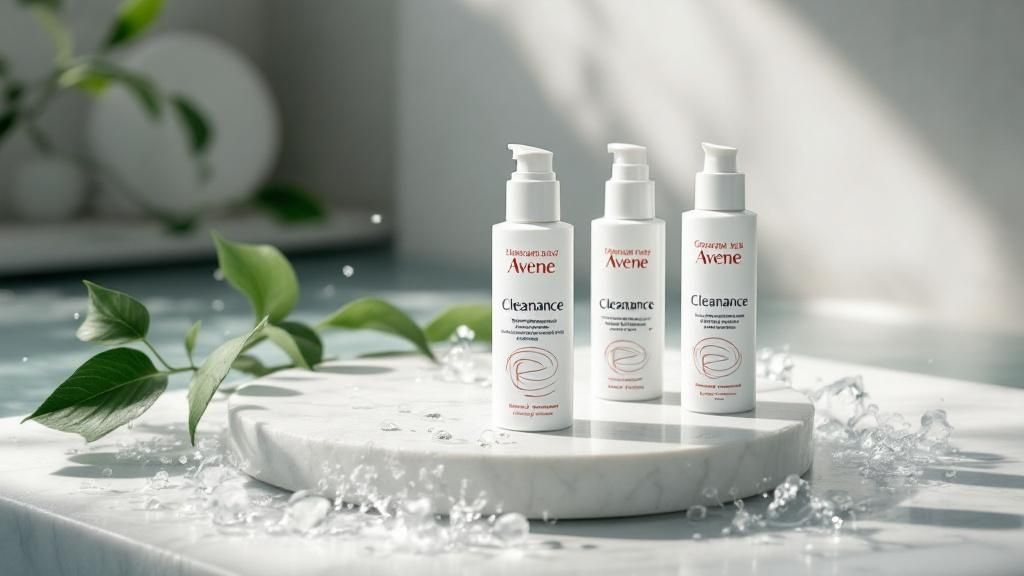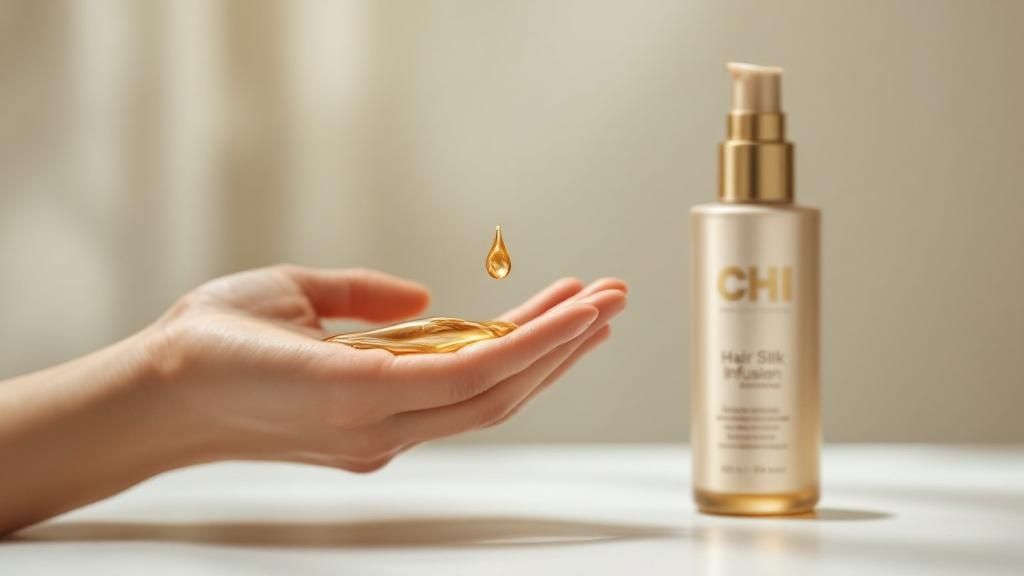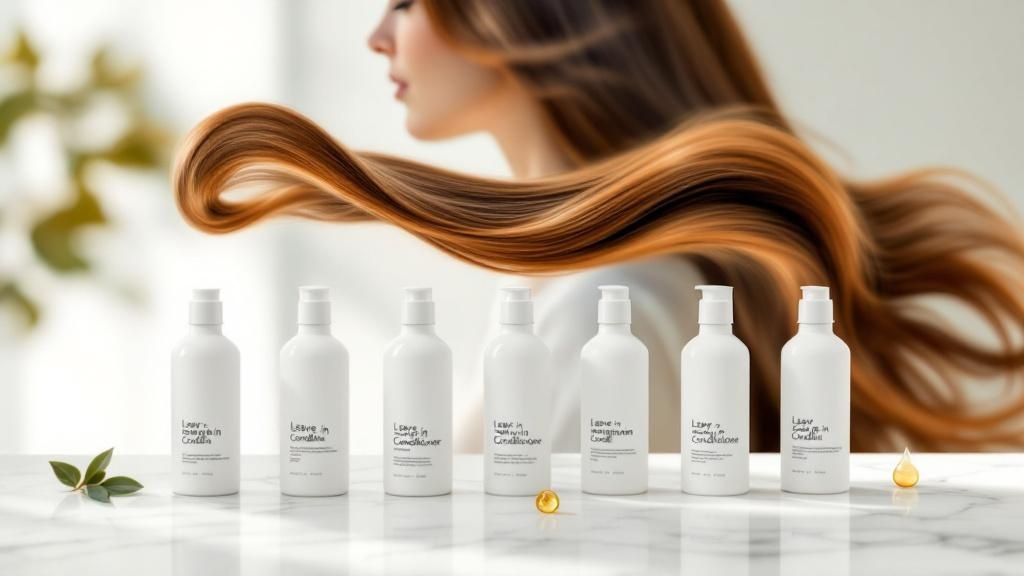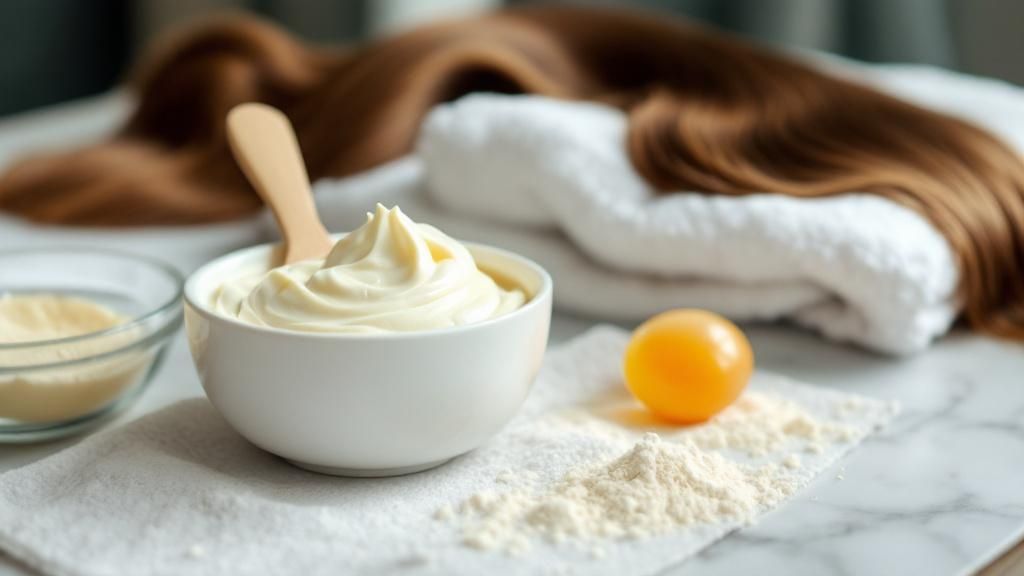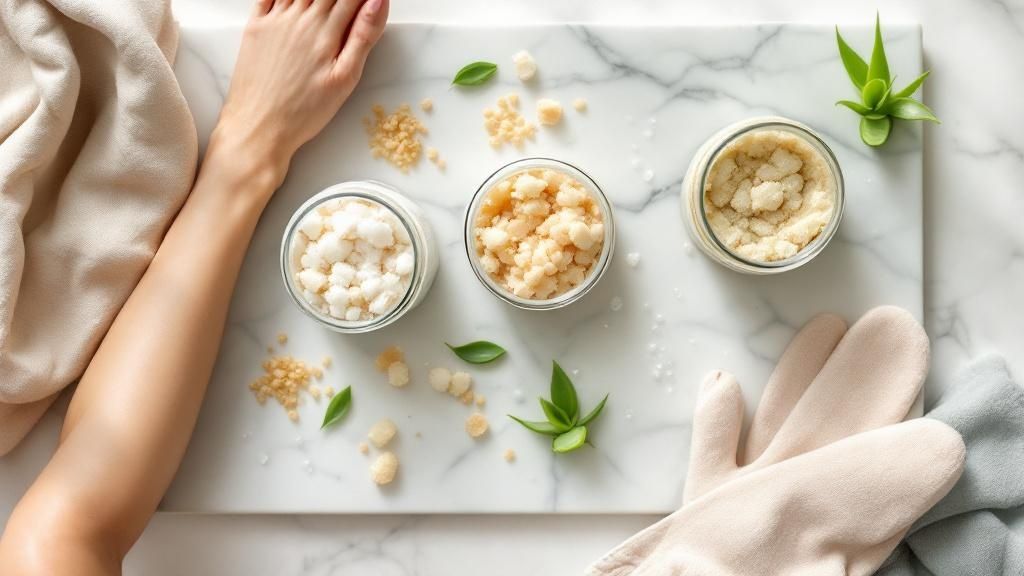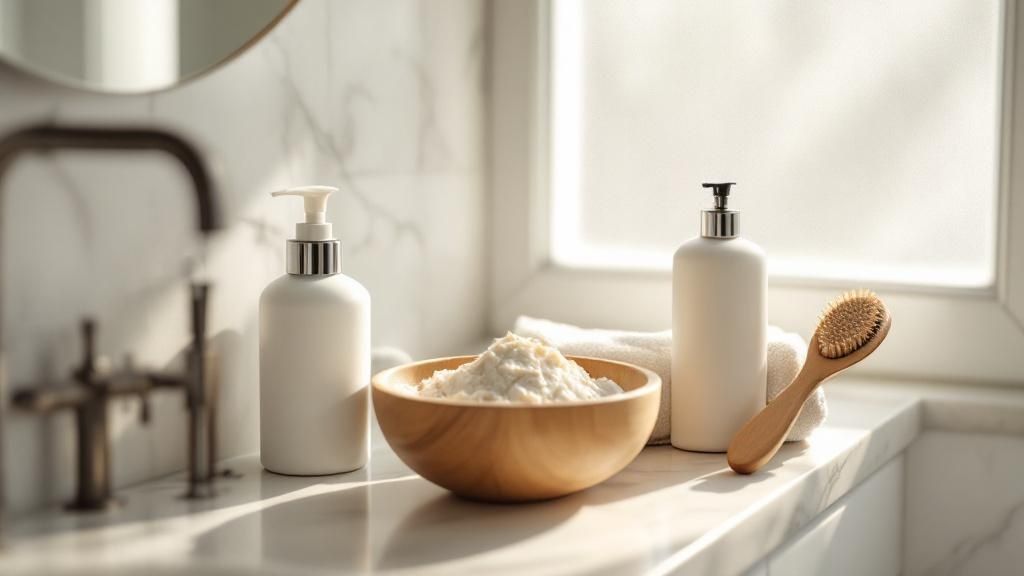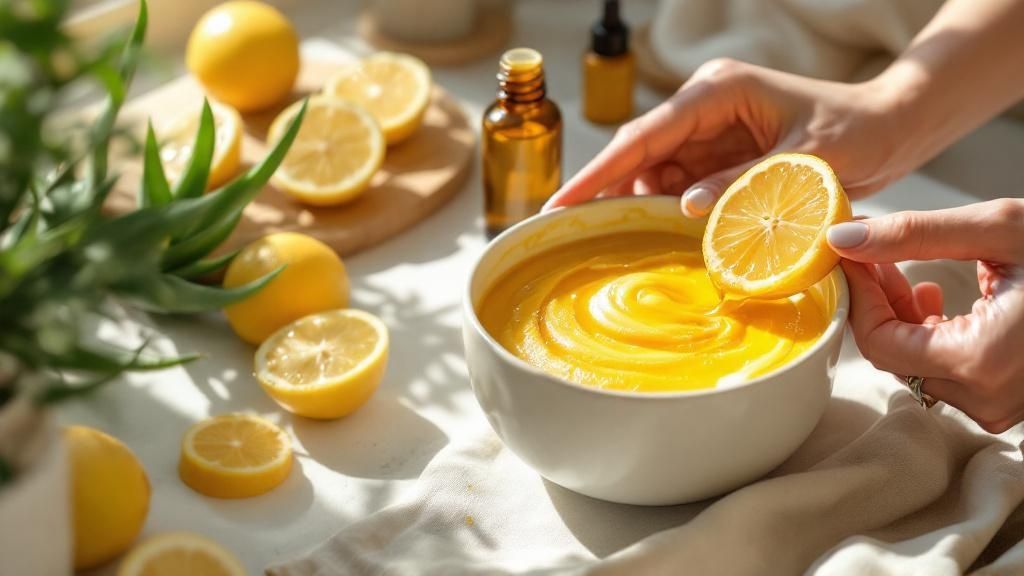
How to Fade Acne Scars Naturally: Top Tips & Remedies
If you’re looking to fade acne scars naturally, consistency is your best friend. It’s all about using ingredients that encourage cell turnover, calm inflammation, and stop extra pigment from forming in its tracks. Think of it as a two-pronged attack: topical, plant-based remedies combined with supportive daily habits. Together, they work slowly but surely to improve your skin's texture and tone.
Why Natural Remedies Are a Go-To for Fading Acne Scars
Before we jump into the "how," let's talk about what we're actually dealing with. Acne doesn't just vanish without a trace. It often leaves behind a frustrating reminder, and these marks can show up in a couple of different ways.
Most of what people call "scars" are really just discolouration. This is known as post-inflammatory hyperpigmentation (PIH), which leaves flat brown, red, or even purple spots where a pimple used to be. It happens because the inflammation from the breakout sends your skin's melanin production into overdrive.
Then you have the true, textured scars, called atrophic scars. These form when a bad breakout damages the collagen deep in your skin, leaving a little depression behind. They have a few distinct shapes:
- Ice Pick Scars: These look like small, deep pits in the skin.
- Boxcar Scars: You'll recognise these as wider, box-like depressions with sharp edges.
- Rolling Scars: These are broader depressions that give the skin a sloping, wave-like look.
Harnessing the Power of Plants
So, where do natural remedies fit in? It turns out many plants are packed with compounds that directly target the very processes that cause scarring. Some extracts and oils are loaded with antioxidants that soothe that initial inflammation, stopping it from creating dark spots. Others contain gentle, natural acids that exfoliate the top layer of skin, making way for new, unmarked cells to come through.
The real magic of natural ingredients is that they support your skin’s own healing powers. Instead of forcing a change with harsh chemicals, they give your skin the building blocks it needs—like vitamins and fatty acids—to repair itself from the inside out.
This gentle approach is particularly popular in places where acne is common. In Egypt, for example, where self-reported acne affects a staggering 39.1% of women, there's a huge demand for traditional, natural solutions like herbal extracts and plant oils. People are actively seeking effective ways to handle the scars that so often follow a breakout. You can learn more about these consumer trends and acne prevalence statistics at Insights10.
Once you know which type of scar you're working with, you can pick the right natural ingredients for the job. Whether you're trying to brighten dark spots or rebuild collagen to smooth out texture, a targeted approach will set you up for success.
Kitchen-Based Treatments for Dark Spots
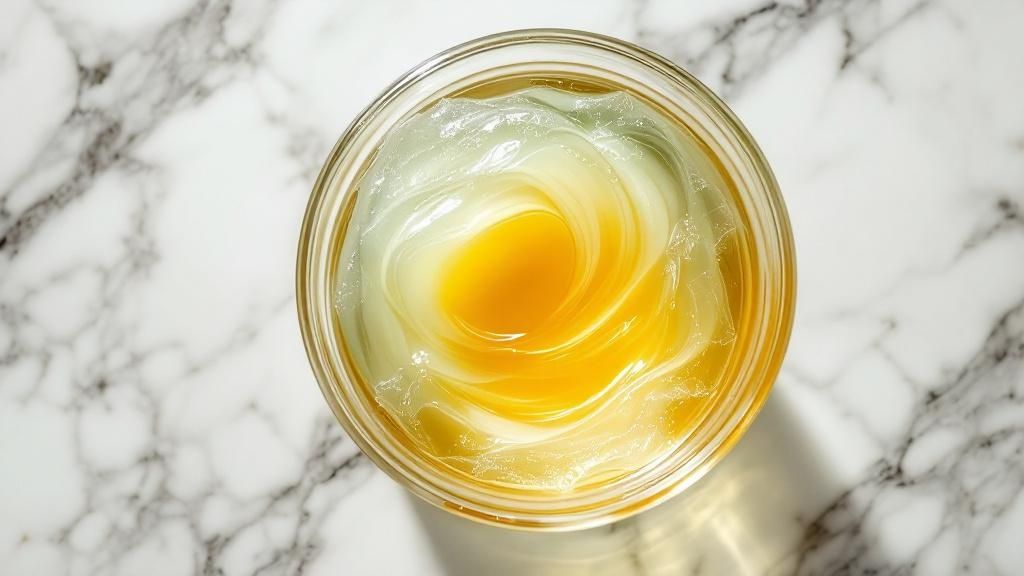
You might be surprised to learn that you don't need a shelf full of complex formulas to start fading acne scars. Some of the most effective ingredients for tackling those stubborn dark spots might already be sitting in your kitchen. These simple, natural treatments can be a fantastic way to deal with post-inflammatory hyperpigmentation.
The real trick is knowing which ingredients to use and how to apply them safely. When you decide to go the natural route, your best friends will be consistency, patience, and always, always patch testing first.
Lemon and Honey Brightening Mask
This is a classic for a reason. Lemons are packed with citric acid, a natural alpha-hydroxy acid (AHA) that gently exfoliates the skin's surface. This helps lift away the darker, pigmented cells, revealing the brighter skin underneath.
Honey, especially the raw, unpasteurised kind, is a wonderful humectant, meaning it draws moisture into the skin. It also boasts antibacterial and anti-inflammatory properties, perfect for calming any leftover redness and even helping to prevent new breakouts.
How to whip it up:
- Simply mix one tablespoon of raw honey with about half a teaspoon of fresh lemon juice.
- Spread a thin, even layer onto clean, dry skin, paying extra attention to the areas with dark marks.
- Let it sit for 10-15 minutes, then rinse it all off with warm water.
Because lemon juice can increase sun sensitivity, I always recommend using this mask in the evening. And stick to once a week, as overdoing it can cause irritation.
Turmeric and Yoghurt Anti-Inflammatory Paste
Turmeric is a true superstar when it comes to fighting inflammation. It contains a compound called curcumin, which studies have shown can inhibit the enzyme that kicks melanin production into overdrive. By calming inflammation and blocking excess pigment, you’re tackling dark spots at their source.
Plain yoghurt is the perfect partner here. It contains lactic acid, another gentle AHA, which helps to smooth and exfoliate. Its creamy texture also provides a soothing base and helps prevent the turmeric from staining your skin.
To make the paste, just blend one teaspoon of turmeric powder into two tablespoons of plain, full-fat yoghurt until you have a smooth paste. You can apply this to specific spots or your whole face. After 15 minutes, rinse it off. It's gentle enough to use a couple of times a week.
Remember, the goal with any natural remedy is to support your skin's healing process, not force it. Gentle, consistent application is far more effective than an aggressive approach, which can often backfire and cause more irritation.
If you want to boost your DIY routine, adding a professionally formulated product can make a big difference. For instance, something like the CeraVe Blemish Control Gel, which uses both AHAs and BHAs, works beautifully alongside these natural remedies to clear pores and fade marks.
Potato Juice Spot Treatment
This one might sound a bit strange, but don't knock it until you try it. The humble potato contains an enzyme called catecholase, which is known for its skin-lightening effects. It’s incredibly gentle, making it a brilliant choice if you have sensitive skin that doesn't get along with more acidic ingredients.
All you have to do is grate a small chunk of raw potato and squeeze out the juice. Use a cotton bud to dab the juice right onto your dark spots. Let it air dry for about 20 minutes before rinsing. It's so mild you could even do this daily without any issues.
Tackling Textured Scars With Natural Oils
While homemade pastes can work wonders on discolouration, indented scars—like rolling or boxcar types—are a different ball game. They're caused by damage deep within the skin's collagen structure, so you need to approach them differently. To see real improvement, you have to support your skin's natural regeneration process, boost its elasticity, and provide some serious hydration. This is where plant-based oils can be incredibly effective.
Many of these oils are brimming with essential fatty acids, vitamins, and antioxidants that help rebuild the skin from the inside out. They encourage the synthesis of new collagen and make your skin more resilient. Over time, this can help gently "plump up" those depressed areas, leading to a smoother, more even surface. As you can see below, applying a nourishing, lightweight product is a fundamental part of any restorative skincare routine.
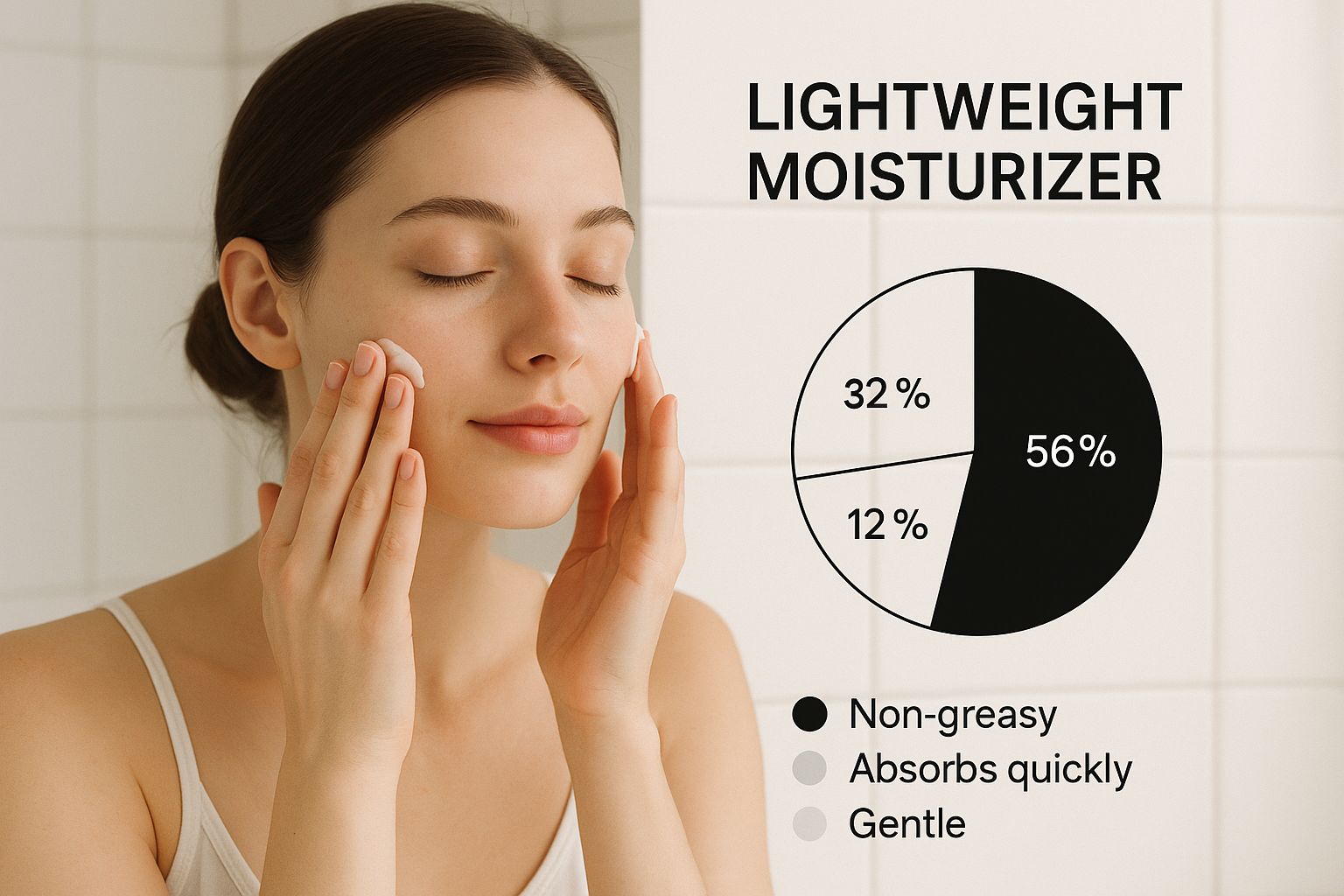
This simple visual shows just how important gentle application is. A mindful, consistent routine is what ultimately builds healthier, more resilient skin.
Powerful Oils for Skin Regeneration
Here are a few of the most respected oils for helping skin recover and repair itself:
- Rosehip Oil: I often call this one a powerhouse for skin repair. It’s packed with vitamins A and C, which are absolutely essential for encouraging cell turnover and producing collagen. On top of that, its fatty acids help to strengthen your skin's natural moisture barrier.
- Aloe Vera: It's so much more than just a remedy for sunburns. Aloe vera contains powerful compounds that can speed up wound healing and calm down inflammation. Its gel-like texture provides a burst of hydration without any risk of clogging pores, which makes it a safe bet for nearly every skin type.
- Black Seed Oil (Habba Sawda): This is a remedy that’s been treasured in Egyptian tradition for generations, and for good reason. Black seed oil is known for its potent anti-inflammatory and antioxidant properties. It’s fantastic for soothing irritated skin and supporting the healing process, especially if your skin is still recovering from active breakouts.
The prevalence of acne makes these traditional remedies more relevant than ever. In Egypt, it's estimated that 60% of female secondary school students struggle with acne. This condition doesn't just affect the skin; it can significantly impact quality of life and often leads to scarring. This high rate has sparked a renewed interest in complementary and alternative medicine to manage the aftermath. For more insight into these findings, you can explore the details in this 2021 study.
How to Add Oils to Your Daily Routine
You definitely don’t need to use all of these oils at once. The real secret is finding the one your skin loves and then sticking with it. Consistency is everything.
Here are a few simple ways to work them into your existing routine:
- A Nightly Treatment: After cleansing and toning in the evening, gently press 2-3 drops of your chosen oil onto skin that is still slightly damp. This simple trick helps lock in moisture and lets the oil get to work while you sleep.
- A Carrier for Potent Oils: Some oils, like black seed oil, are quite strong and are best diluted. You can easily do this by mixing a few drops into a gentler carrier oil, like jojoba or almond oil, before applying it.
- Targeted Application: If you have a few specific scars you want to focus on, use a cotton bud to apply a tiny amount of oil directly onto the indented area.
My Personal Tip: Whenever you introduce a new oil, do a patch test first. Apply a small amount to your inner arm and wait 24 hours. This is the best way to make sure you won't have an unwanted reaction on your face. Always start with just one new product at a time.
Choosing the Right Natural Oil for Your Acne Scars
To help you decide which oil might be the best starting point for you, it helps to understand their unique strengths. Each one offers something a little different.
This table breaks down the primary benefits of these popular oils and which skin and scar types they're best suited for.
| Natural Oil | Primary Benefit | Best For Scar Type | Ideal Skin Type |
|---|---|---|---|
| Rosehip Oil | Collagen boosting & cell regeneration | Rolling & Boxcar Scars, Hyperpigmentation | Dry, Normal, Combination |
| Aloe Vera | Soothing inflammation & hydrating | All scar types, especially new/red marks | Oily, Combination, Sensitive |
| Black Seed Oil | Anti-inflammatory & antioxidant | Inflamed acne marks, Textured Scars | Normal, Combination, Dry |
By picking the right oil for your specific needs and applying it with a little patience, you're giving your skin exactly what it needs to begin repairing textural damage, the natural way.
Daily Habits That Accelerate Scar Healing
https://www.youtube.com/embed/66VdylXI0nQ
Figuring out how to fade acne scars naturally goes way beyond the oils and masks you put on your skin. What you do every single day creates the internal environment that either helps or hinders your skin's ability to repair itself. Think of it as supporting all your topical treatments from the inside out.
Your daily habits really are the foundation of your entire scar-fading journey. If you ignore them, it's like trying to build a house on shaky ground—it just won’t be as effective. The single most important, non-negotiable habit you need to adopt is rigorous sun protection.
The Critical Role of Sun Protection
Sunlight might feel lovely, but UV radiation is one of the biggest enemies of scarred skin. When UV rays hit a new or healing scar, they send your skin's pigment-producing cells into overdrive. This can turn a faint red or brown mark into something significantly darker and much more stubborn to treat.
Honestly, all your hard work with natural remedies can be completely undone by just a few minutes of unprotected sun exposure. It’s absolutely essential to make sunscreen a non-negotiable part of your morning routine. Every single day. Rain or shine.
For a product that offers protection while also working on pigmentation, you might want to look into options like the Eucerin Even Pigment Perfector Day Cream with SPF30, which can be a great complement to your natural routine.
Shielding your skin from the sun is not just a preventative measure; it’s an active treatment. By blocking UV rays, you are actively preventing your scars from becoming darker and more difficult to fade.
Nourishing Your Skin From Within
It sounds cliché, but you truly are what you eat. Your diet directly impacts your skin’s health and its capacity to heal. A balanced diet, rich in specific nutrients, provides the building blocks your body needs to regenerate healthy tissue and calm inflammation.
Try to focus on incorporating these key elements into your meals:
- Antioxidants: Found in colourful fruits and vegetables like berries, spinach, and bell peppers, antioxidants fight off the free radical damage that can slow down your skin's healing process.
- Vitamin C: This is a true superstar for skin health. It's crucial for synthesising collagen, which helps repair the skin's structure and can improve the look of textured scars. You’ll find it in citrus fruits, kiwis, and broccoli.
- Zinc: An essential mineral for wound healing and reducing inflammation. Good sources include nuts, seeds, and legumes.
Beyond just food, simple hydration is incredibly important. Drinking plenty of water keeps your skin cells plump and supple, which helps improve its overall texture and supports healthy cell turnover. Try to aim for around eight glasses a day.
Finally, never, ever underestimate the power of a good night's sleep. Your body goes into full-on repair mode while you rest, producing growth hormones that are vital for cell regeneration. Aiming for 7-9 hours of quality sleep per night gives your skin the uninterrupted time it needs to heal the damage left behind by breakouts.
Common Mistakes That Worsen Acne Scars

As you start exploring how to fade acne scars naturally, it's just as important to understand what not to do. I’ve seen it time and time again: people with the best intentions accidentally sabotage their own progress. Certain common habits can trigger irritation, more breakouts, and even deeper, more stubborn scarring. Avoiding these traps is a massive part of getting the clear, smooth skin you're working so hard for.
One of the biggest mistakes is getting too aggressive with exfoliation. It’s so tempting to think that scrubbing harder or piling on the acids will fast-track your results, but this almost always backfires. Over-exfoliating, whether with rough physical scrubs or acids that are too strong, strips your skin of its natural protective oils and compromises its moisture barrier.
When your skin's barrier is damaged, it can't defend itself properly. This leads directly to more sensitivity, redness, and—you guessed it—more breakouts. Instead of healing, you end up in a cycle of inflammation that makes existing marks darker and new scars more likely to form.
The Dangers of Picking and Popping
We all know we shouldn't, but let's be honest, the urge to pick at a blemish can feel impossible to resist. Please trust me on this: it is single-handedly the fastest way to turn a temporary pimple into a permanent scar. Squeezing a spot shoves bacteria and inflammation deeper into the dermis, causing far more trauma to the delicate tissue and collagen underneath.
That intense, localised damage is precisely what creates those indented, atrophic scars or the dark spots we know as post-inflammatory hyperpigmentation. Acne is already an inflammatory condition; picking just pours petrol on the fire, making the resulting marks so much worse.
The impact of acne and its scars is more than just skin deep. A study looking at adolescents here in Egypt found that the resulting scars and pigmentation are present in a significant number of cases. These marks can take a real toll on self-esteem, especially for young women. You can explore the study's findings on acne's quality of life impact to understand more.
Ignoring Patch Tests and Consistency
When you’re excited to try a new natural remedy, the first instinct is often to slather it all over your face. This is a classic mistake. Even completely natural ingredients can cause allergic reactions or irritation, so you absolutely must do a patch test. Just apply a small amount to a discreet spot, like your inner arm, and wait 24-48 hours to see how your skin reacts.
On the other hand, a lack of consistency is the biggest enemy of progress. Natural remedies don't offer overnight miracles; they work by supporting your skin's slow, steady regeneration process. Applying a mask one time and expecting to wake up scar-free is just not realistic. You have to stick with your chosen routine patiently for weeks, sometimes months, to see real change.
Here are a few things to keep in mind:
- Be Patient: Fading scars takes time. Don’t get discouraged if you don’t see results in a week and start switching products constantly.
- Be Gentle: Your skin is a living organ, not a countertop to be scrubbed raw. Always treat it with care.
- Be Consistent: A simple routine you do every day will always beat a complicated one you only manage sporadically.
Finally, while DIY remedies are fantastic, you can often boost their effectiveness by pairing them with a well-formulated product. For instance, using a gentle chemical exfoliant like the Isispharma Neotone Gel can help sweep away dead skin cells without the harshness of a physical scrub, perfectly complementing your natural approach.
Your Questions About Natural Scar Healing Answered
Diving into the world of natural skincare for acne scars always sparks a lot of questions. It's completely normal to feel a bit uncertain about timelines, safety, and how these remedies play well with other products you might already be using. Getting clear, practical answers is the best way to feel confident and stay motivated on your skin journey.
I want to tackle some of the most common questions I hear. By clearing up these concerns, you can move forward with your routine, knowing you’re making safe and effective choices for your skin. Let’s get you some answers.
How Long Does It Really Take To See Results?
This is, without a doubt, the number one question. The honest-to-goodness answer is: it really depends. When you decide to fade acne scars naturally, patience and consistency are your two best friends. These remedies aren't about forcing an overnight fix; they work by supporting your skin's own slow and steady regeneration process.
For those surface-level dark spots, what we call post-inflammatory hyperpigmentation (PIH), you could start seeing some fading in as little as 4-6 weeks if you're consistent every single day. But for deeper, textured scars that involve damage to the collagen underneath, the timeline is much longer. We're talking several months, maybe even up to a year, before you’ll notice a real improvement in your skin's texture.
Here's a little trick I tell everyone to stay motivated: take photos in the same lighting once a month. Progress can be so gradual that you just don't see it day-to-day. A side-by-side photo comparison can suddenly reveal subtle improvements, proving all your effort is paying off.
Your individual results will always come down to a few key things:
- The scar itself: Newer, shallower marks will always respond faster than older, more established ones.
- Your unique skin type: Everyone's skin just regenerates at its own pace.
- How consistent you are: A simple routine you actually stick to every day will always beat a complicated one you only manage now and then.
Can I Mix Natural Remedies With Retinoids?
Technically yes, but you have to be extremely careful. Mixing active treatments is a fast track to irritation if you don't know what you're doing. A lot of DIY ingredients, especially acidic ones like lemon juice, can make your skin incredibly sensitive or even cause a reaction when you layer them with powerful chemical exfoliants like retinoids.
If you’re using a prescription-strength product from a dermatologist, you must always check with them before adding anything new to your routine—natural or not. Your doctor is the expert on your skin's specific condition and can give you the safest advice.
A much smarter approach is to think of natural ingredients as supportive partners. Instead of layering more exfoliants, pair your conventional treatments with gentle, hydrating natural options. For instance, using pure aloe vera gel or a few drops of rosehip oil can help soothe the skin and bolster your moisture barrier, which often takes a hit from strong actives like retinoids.
Are Some Natural Ingredients Unsafe for Facial Skin?
Absolutely, yes. This is such a critical point and one that gets missed all the time. Just because an ingredient is "natural" doesn't automatically make it safe to slather on the delicate skin of your face.
Some of the most popular natural suggestions can actually do more harm than good. Undiluted essential oils, for example, can cause chemical burns. Raw baking soda is another big no-no; it’s highly alkaline and can completely wreck your skin's natural pH balance, destroying your moisture barrier and leading to more irritation, dryness, and even breakouts. Even something as common as lemon juice needs to be heavily diluted and used with caution, as it makes your skin extremely sensitive to the sun.
The golden rule here is simple: always perform a patch test. Before you put any new ingredient on your entire face, test a tiny amount on your inner arm. Wait a full 24 hours to make sure you don't have a bad reaction.
Ready to build a routine with products you can trust? lo.la offers a curated selection of authentic skincare from top international brands, all verified and sourced from official wholesalers. Find the perfect cleansers, serums, and moisturisers to support your journey to clearer skin, with same-day delivery available in New Cairo. Explore the full collection at https://www.lolabeautyshop.com.










